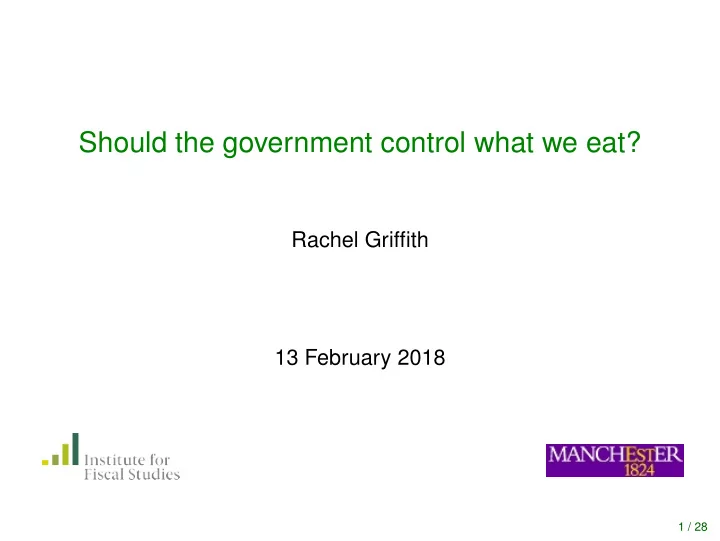

Should the government control what we eat? Rachel Griffith 13 February 2018 1 / 28
Governments try to influence what people eat 2 / 28
Should the government tell people what to eat? ◮ Some people believe that the government should mind its own business ◮ let people decide for themselves ◮ Others argues that consumers need protection from themselves and from outside temptation ◮ What should governments do and how can they do it? 3 / 28
If market functions well, people make appropriate trade-offs 4 / 28
Obesity is a world wide problem Women Men 5 / 28
Obesity is a problem in the UK 6 / 28
Obesity has increased in the UK 7 / 28
Obesity is more common in poorer households 8 / 28
Obesity is more common in less educated households 9 / 28
Obesity has increased across all social classes 10 / 28
Obesity is also high in children 11 / 28
Obesity is more common in the most deprived areas 12 / 28
Obese children become obese adults 13 / 28
What are the consequences of these bad choices? Externalities 14 / 28
What are the consequences of these bad choices? Internalities ւ ց 15 / 28
Why are people making bad choices? They lack information? 16 / 28
Why are people making bad choices? Cognitive overload? 17 / 28
Why are people making bad choices? Lack of self-control? 100 Google search intensity: diet 80 60 40 20 01jan2013 01jan2014 01jan2015 01jan2016 01jan2017 US UK 18 / 28
Why are people making bad choices? Advertising? 19 / 28
How do policies aim to correct these problems? information: cognitive overload: self-control: advertising: 20 / 28
How effective are policies? Evaluation methods help us understand which policies are effective: ◮ how do consumers respond? which consumers respond? ◮ how do firms respond? ◮ we can look at a policy reform, identify a control group, and compare outcomes before and after the policy is implement in the “treatment” and in the “control” group ◮ ex post analysis ◮ we can also use economic theory to help us figure out both what will happen if the policy is implemented and what will happen in the absence of the policy (i.e. what will happen to both the “treatment” and the “control” group) ◮ ex ante analysis 21 / 28
Example of an ex post analysis Impact of introduction of tax on sugar-sweetened beverages in Berkeley CA 22 / 28
Example of an ex ante analysis Likely impact of a soda tax in the UK 23 / 28
Example of an ex ante analysis of how firms respond ◮ Advertising of crisps ◮ lowers people’s willingness to pay for healthier products ◮ lowers their price sensitivity ◮ encourages people to switch to larger pack sizes ◮ banning advertising would lead consumer to reduce crisps consumption by around 15% ◮ The offsetting effects of firms’ response ◮ banning advertising makes consumers more responsive to prices ◮ this intensifies competition in prices ◮ prices in the market would fall by 4% on average ◮ in equilibrium the effect of the advertising ban is to lower demand for potato chips by around 10% 24 / 28
Potential additional confounding factors 25 / 28
Potential additional confounding factors from a ban on advertising unhealthy foods 26 / 28
Group topics and presentations ◮ 10 minutes to come up with key bullet points 1. Should the government use policy to try to influence people’s food choices? 2. Will banning advertising of junk foods reduce consumption of junk foods and so improve health? 3. Will increasing the nutritional information on food packaging reduce consumption of junk foods and so improve health? 4. Will welfare policies that transfer income to poor households help to reduce obesity? 27 / 28
Wrap up ◮ Key points ◮ Where markets work well consumers make the best choices for themselves and society more generally ◮ Where markets fail government intervention can improve things, but it is important that the policy intervention works well and targets the market failure ◮ Understanding whether and how policy affects outcomes is what economists do, it can be complicated, but we can often help guide better policy design 28 / 28
Recommend
More recommend